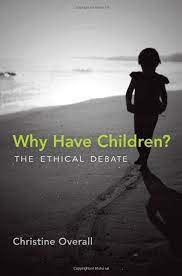
Why have Children : The Ethical Debate, Christine Overall in 2013.
On avril 16, 2023 by labo recherche StandardCompte-rendu de lecture, par Soukaina Abdouni –
In a society where having children is still deemed as a sign of societal and personal success, choosing not to have children comes across as abnormal since one has to justify their choice to not give birth. In fact, generally seen as selfish, irresponsible and even egotistical, childless people remain the prey of all sorts of pressure and contempt. But is this question really that simple ?
The book “Why have children ? The ethical debate” is an essay written by the philosopher and college professor Christine Overall in 2013. Particularly implicated in bioethical issues, Overall ponders this deeply controversial interrogation through philosophy’s lens, by doing so, studies the very issue that revolves around legitimacy to procreate.
Along those lines, this book might provide answers to people afraid to give birth in contemporary unsteady conditions due to the angst instilled by modern society, namely when it comes to geopolitical tensions and environmental anguish. Indeed, human beings are more and more conscious about the unreliable nature of the future, thus, having children remains one of the most fundamental and present fears amongst young adults.
Therefore, this essay investigates a dilemma typical of our era standing against the fact that procreating is what has to be done regardless of justification. By inquiring about this question, Overall addresses people’s most intimate taboos and deconstructs the assumption that having children shouldn’t be interrogated. Either when one wonders about their future or when they’re directly faced with the issue, one ends up asking themselves : why have children? In that case, naturally because of the following consequences and existential worries that procreating implies, the fear briskly takes place in one’s mind and puzzles them. In fact, as uncovered in the introduction of this essay “you cannot know ahead of time” either about the parenthood experience, or the kind of child you will raise. It’s the very inconstancy and unpredictability of the outcomes of such a decision that contribute to nurturing the distress that couples endure. In addition to that, once one has a child, it’s for life, “It is irreversible and for that reason more significant than most other life decisions” : hence, giving birth remains an arduous project to deliberate.
To interrogate this question, Christine Overall constructs her point into nine different perspectives (such as “Reproductive Freedom, Autonomy, and Reproduction Rights” or “Overpopulation and Extinction”) following a succinct introduction where she makes an apparent point : the choice to procreate should go with full-ability to take care of the vulnerable and dependent child, by doing so, should require justification and proof. In a lucid and highly rational approach, Overall dismantles the status quo about the naturalness of giving birth by considering both arguments in favor of procreation and arguments against it through ethical and consequentialist dimensions.
In pursuance of precision, spotlights are strictly pointed on contemporary North American society and heterosexual procreation. Even if the decision to have children comes across as natural and instinctive, birth rates in affluent countries have significantly decreased over the past generation. In fact, more and more couples choose to remain childless and others go for less kids, for instance in Canada : birth rate has decreased from 3.81 children per woman in 1960 to 1.40 in 2022. In response, this decline provokes specific problems such as the aging of population which can slow the economical growth and as a result, strain government budgets. Amongst future populations, this issue will take a more significant place since demographers predict that the world’s birth rate will soon stop increasing – or at least increase much slower than during the last century.
Along those lines, this essay puts the emphasis on the importance of respecting such a personal and estimable decision. From every angle, it is neither more nor less immoral to have children than choosing not to. Even when it comes to environmental issues, advocating a sort of “green totalitarianism” that discourages – or worse, controls – birth rate cannot be considered as legitimate. In fact, standing for an antinatalism ideology means contributing to endangering the whole human world and its chances to survive.
Finally, Christine Overall presents her personal argument after admitting that ethical reasons remain insufficient and lacking thoroughness. Indeed, the fear that procreating implies is neither completely rational nor irrational. She makes the case by writing that the development of the parent-child relationship – and its joys, challenges, lessons, etc… – is probably the best possible reason for choosing to give birth.
Soukaina ABDOUNI
Laisser un commentaire